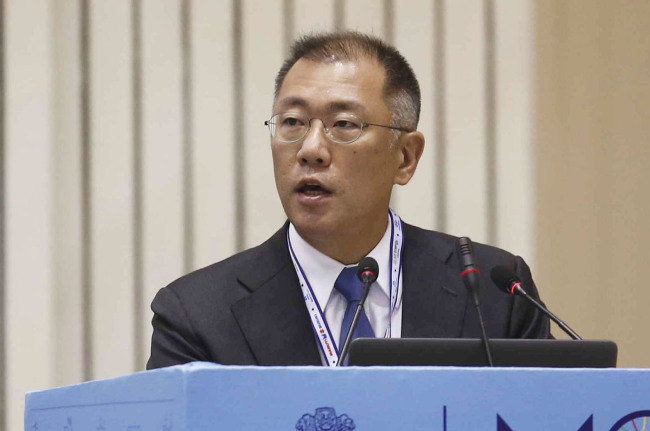Chung Eui-sun, now officially the second in command at South Korea’s biggest automaker and second-largest conglomerate, will be able to wield greater power across 55 affiliates, operating in business areas ranging from steelmaking and construction to finance, industry sources said Sunday.
The 48-year-old heir apparent will assist his 80-year-old father in his newly created post, a notch higher than the six existing vice chairmen in charge of the group’s automaking, steelmaking and finance units.
“The executive vice chairman is officially No. 2 on the corporate ladder, and is expected to take responsibility not just for the automobile business but also for the steel, construction and finance businesses,” said a group official.
 |
Chung Eui-sun (Yonhap) |
According to the company’s statement Friday, having Chung Eui-sun more openly and directly assist the chairman is intended to bolster the group’s competitiveness in the era of the “fourth industrial revolution,” and to secure new growth engines.
Some industry analysts say Chung’s recent promotion, announced Friday, also could be seen as part of a process in which Chairman Chung Mong-koo is passing on the leadership role to his son.
But the decision is not about the chairman passing the baton to his son either, though it can be seen as part of “such a process,” the company said.
However, the business community notes that Chairman Chung had given freer rein to his son at times of crises in the past.
Chung Eui-sun was named CEO of Kia Motors in 2005 when the company suffered losses. The heir led Kia back into the black by launching the K series, introducing a radical change in design. Kia made a turnaround from an operating deficit of 55.4 billion won ($49.4 million) in 2007 to a 308.5 billion-won surplus the following year.
In 2009, when Chung was promoted to vice chairman, the global automobile industry was hit by the US-triggered financial crisis that caused America’s three biggest carmakers -- General Motors, Ford and Chrysler -- to face possible bankruptcy.
With greater authority, Chung is expected to seek even more radical changes across the automaking group, such as in organizational reshuffles and the governance structure, to turn Hyundai Motor from a traditional car manufacturer into a “smart mobility solution provider,” according to the industry.
The heir has been actively engaged in future businesses of the automobile industry, for example, by forging partnerships and making investments in various startups across industries. Last year alone he spearheaded investment in 11 global technology companies engaged in autonomous driving, connectivity, smart mobility, fuel cell vehicles and electric vehicles.
“Chung’s promotion can also be interpreted as his father testing him again with some challenging tasks,” said an industry insider. “Chung‘s foremost job would be to recover the automaker‘s performances in major markets like the US and China, while continuing to search for new growth engines.”
By Song Su-hyun (
song@heraldcorp.com)







![[Today’s K-pop] Blackpink’s Jennie, Lisa invited to Coachella as solo acts](http://res.heraldm.com/phpwas/restmb_idxmake.php?idx=644&simg=/content/image/2024/11/21/20241121050099_0.jpg)
